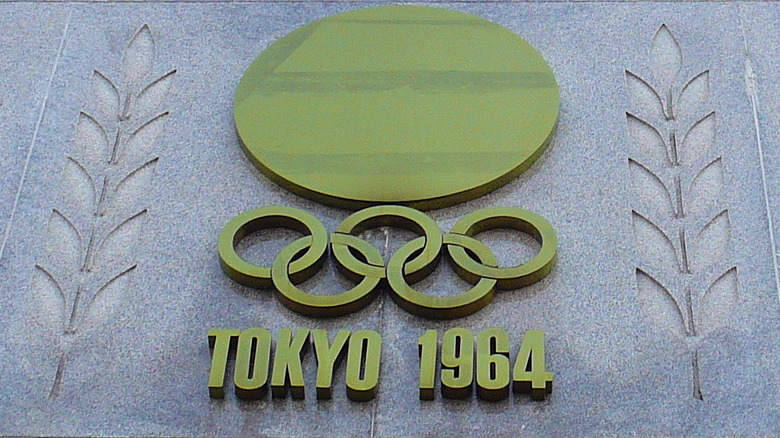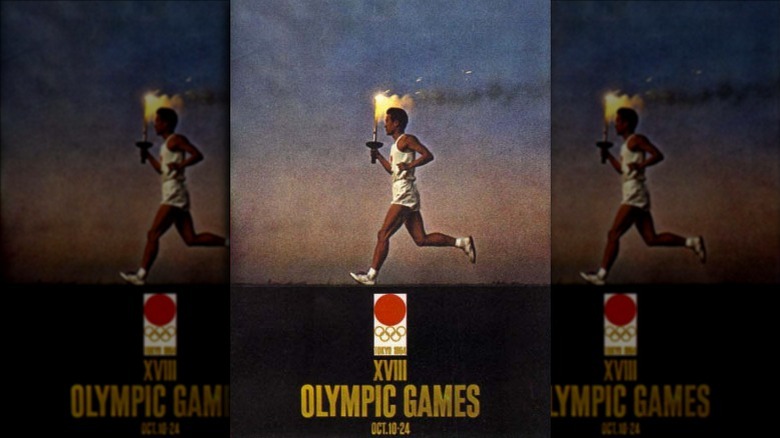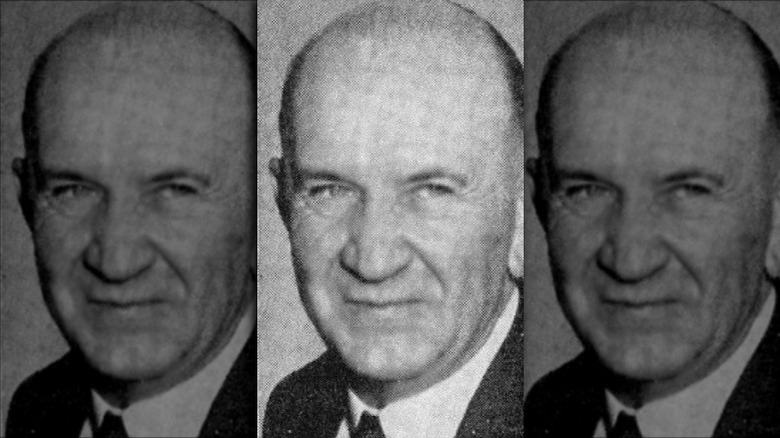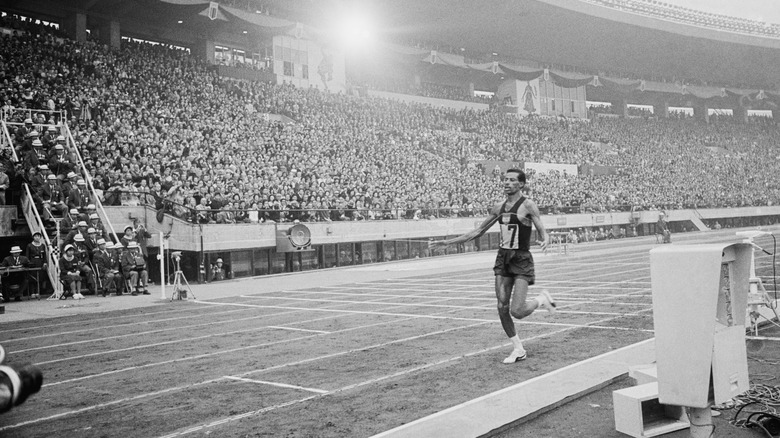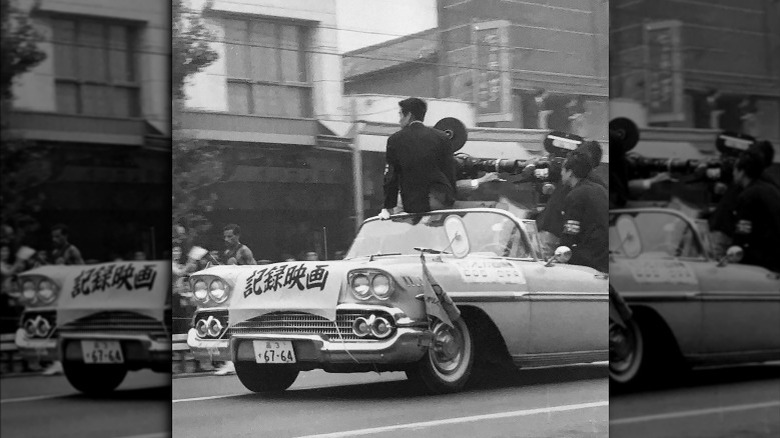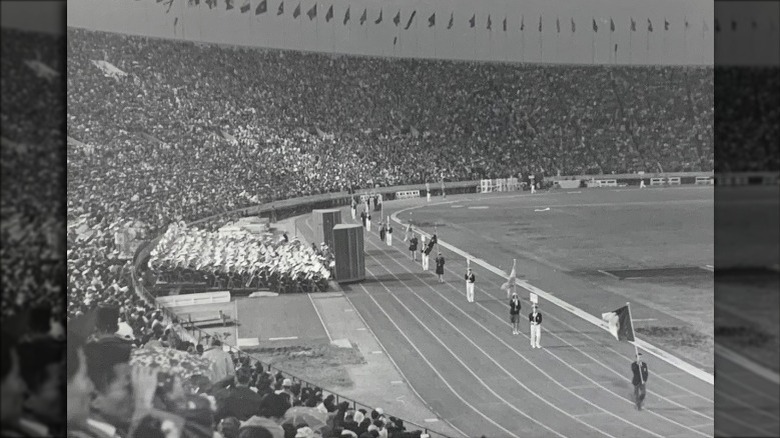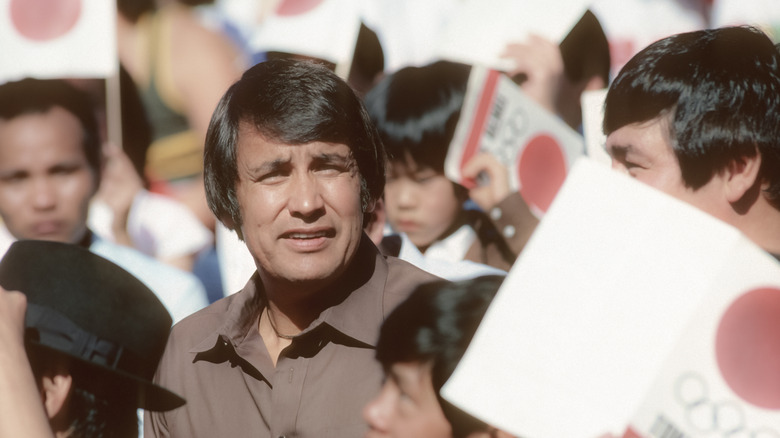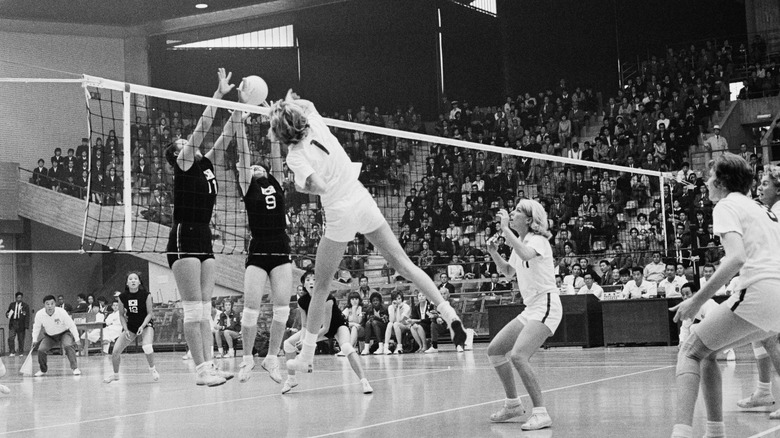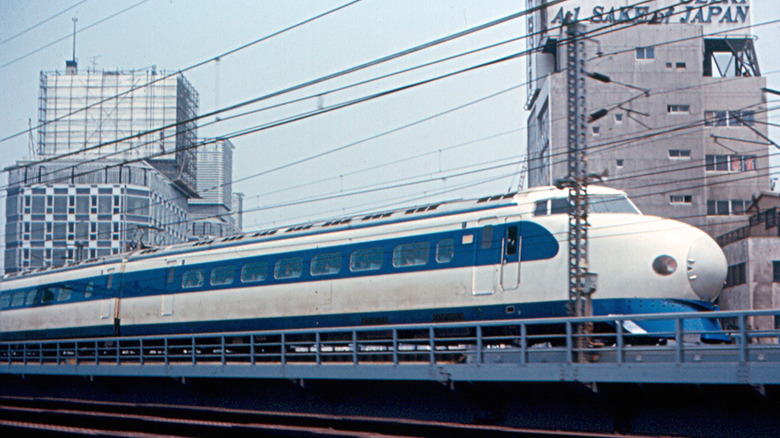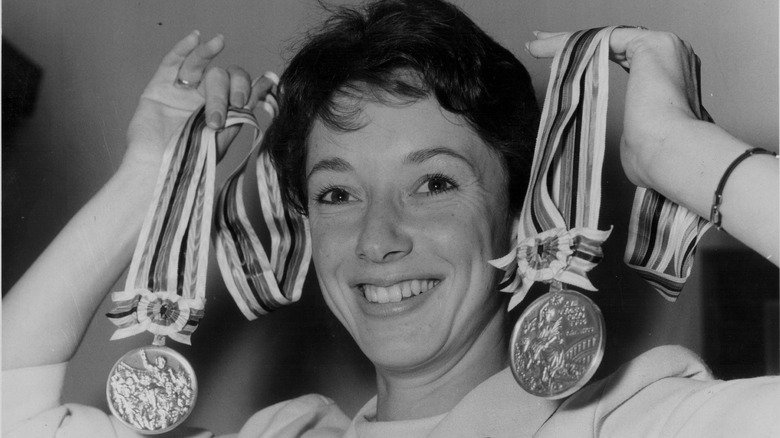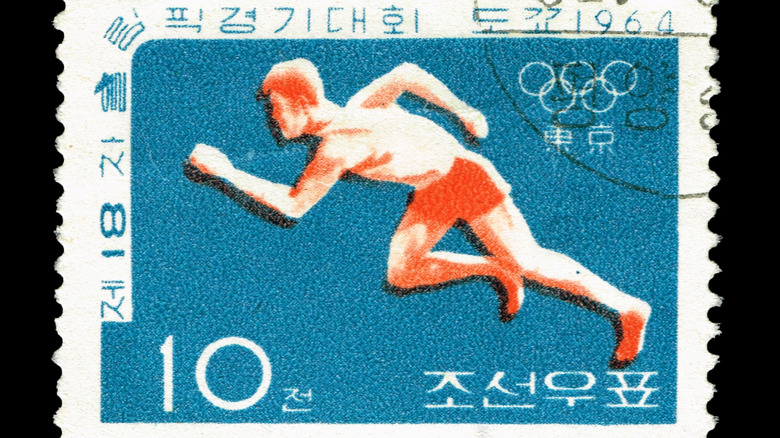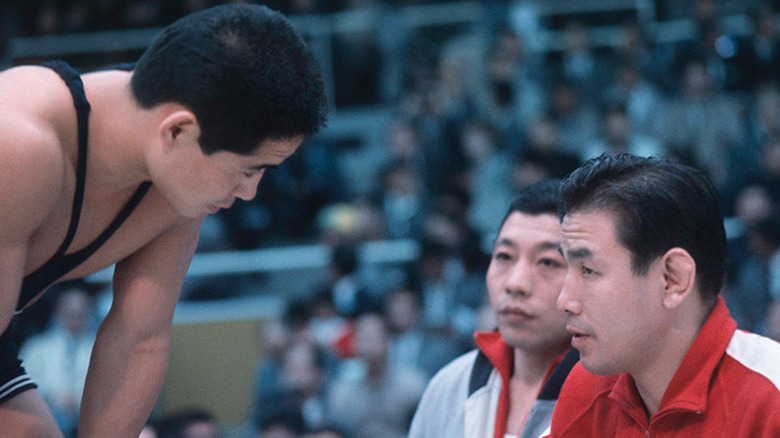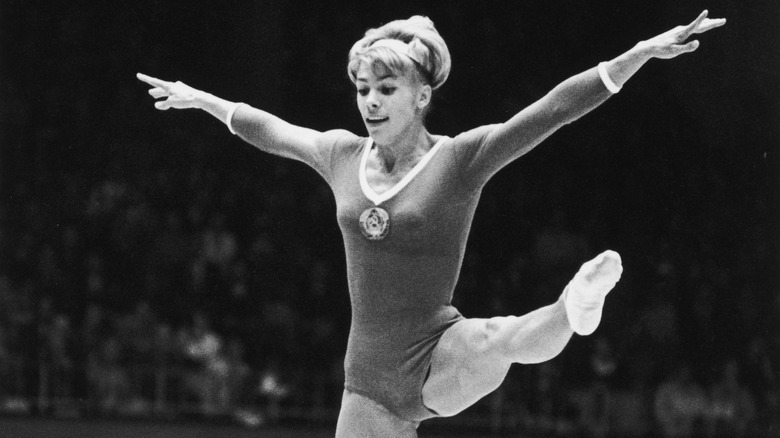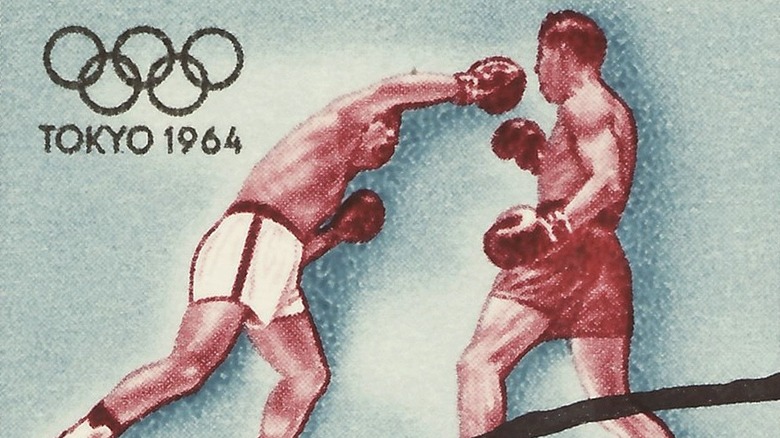Crazy Stories From The Last Time Tokyo Hosted The Olympics
With the delayed 2020 Olympics in Tokyo finally happening in 2021, it's worth looking back on the first time that Tokyo hosted the Olympics in 1964. Lasting from October 10-24, the 18th Summer Olympic Games were novel in many ways. They also featured a number of world records made and broken as well as nations made and dissolved.
Many remark upon the technological feats of the 1964 Tokyo Olympics, while others mention the great upsets that occurred during the games. But no matter what part is pointed at, the 1964 Tokyo Summer Olympics remain notable in history for a number of reasons.
But the athletics weren't the only crazy thing about the 1964 Olympics. The city of Tokyo went through a great deal to put on the Olympics, and not all the effects were positive. The city ended up forever changed largely in part to its hosting of the 1964 Summer Olympics. And some people, like Kohei Jinno, who was evicted to make way for the construction of the National Stadium for the 1964 Olympics, find themselves being evicted once more as the Olympics rolls back into town. Here are some crazy stories from the last time Tokyo hosted the Olympics.
Tokyo was the first non-Western city to host the Olympics
When Tokyo hosted the 1964 Summer Olympics, officially known as the Games of the XVIII Olympiad, it was the first non-Western city to host the Olympics. But it actually wasn't the first time that Tokyo was chosen to host the Games.
The Associated Press writes that in 1936, Tokyo was chosen to host the 1940 Summer Olympics. And since the selected nation also had the option of hosting the Winter Olympics as well, Sapporo was meant to host the 1940 Winter Olympics. However, after Japan invaded China in 1937, it ended up giving up its hosting duties because military leaders claimed that they needed the metal set aside for building the venues for the war effort.
The 1940 Olympics were then rescheduled for Helsinki, who had been the runner-up in the bidding for host city. However, when World War II started in September 1939, the Olympics just ended up being cancelled altogether. Helsinki would go on to host the 1952 Summer Olympics after World War II ended. And in 1964, Tokyo finally had its chance to host the Olympics. And according to Give Me Sport, with the upcoming 2020 Olympics, Tokyo is also the first Asian city to host the Olympic Games twice.
South Africa was excluded from the 1964 Tokyo Olympics
Having joined the International Olympic Committee in 1911, South Africa competed with exclusively white teams in the Olympics from 1912 to 1936. In 1948, this was changed to racial segregation in sports, with separate teams of Black athletes and white athletes. But in response to the country's apartheid policies, according to Ufahamu: A Journal of African Studies, in 1959, a campaign began within the IOC, led by Soviet Union representatives General Stortschev and Alexi Romanov, to ban South Africa from the Olympics due to their apartheid policies.
However, despite international pressure to integrate the teams, the apartheid policy remained, with South Africa's Minister of the Interior Johannes de Klerk (pictured) claiming that it would be "inadmissible" for Black South Africans to be considered as representing white South Africans.
South African History Online writes that one year before the 1964 Summer Olympics, the International Olympic Committee told South Africa that if they didn't integrate their Olympic teams, then they would be banned from the Olympics. South Africa missed their first deadline and after an extension, they announced seven non-white people out of their team of 62 athletes. However, this wasn't good enough and on August 18, 1964, South Africa was banned from the Olympics for the very first time, per the BBC. In October 1964, South Africa was also given an indefinite suspension by FIFA.
Two time marathon champion
Abebe Bikila had already shown the world what he was capable of when he won the gold medal running the Olympic marathon in Rome in 1960. And because his new running shoes were causing blisters, according to The Guardian, Bikila ended up winning the marathon while running barefoot. That year, Bikila, from Ethiopia, also became the first Black African person to win an Olympic gold medal, along with Ike Quartey from Ghana, who won an Olympic silver medal in boxing.
Four years later in the 1964 Tokyo Olympics, World Athletics writes that Bikila returned to run in and not only did he successfully defend his gold medal, but he set a new world record of 2:12:11.2. In doing so, Bikila also became the first person to win the Olympic marathon twice. And just 40 days earlier, Bikila had been in the hospital, undergoing an appendectomy. Bikila's athletic career lasted from 1960 to 1966, during which time he won 12 out of the 13 marathons he entered. The only marathon Bikila lost was when he placed 5th in the 1963 Boston Marathon.
Tragically, Bikila was in a car accident in 1969 that left in paralyzed, and in 1973, he died from a brain hemorrhage related to the injuries he sustained from the accident.
1964 saw the first live worldwide broadcast of the Olympics
The 1964 Tokyo Summer Olympics were notable in that they were the very first Olympics to be broadcast live around the globe. Although the 1960 Rome Olympics were the first to be broadcast live, they were only televised in Europe. But according to the Guinness World Records, the 1964 Tokyo Olympics were the first ones to reach a worldwide audience. And for those in Japan, the Olympic coverage was even in color.
This was made possible due to SYNCOM 3, the first geostationary satellite. But according to Via Satellite, because NBC "was adamant about preserving its rights," only the Opening Ceremonies were televised live in the United States.
The 1964 Tokyo Olympics were also technologically notable due to the fact that it was the first Olympics to involve computers. In "Understanding the Olympics," John Horne and Garry Whannel write that the 1964 Tokyo Olympics used a computer system designed by IBM to "report, record, and transmit text data of the sports events."
Zambia declared independence during the Closing Ceremony
Although the Federation of Rhodesia and Nyasaland was dissolved on December 31, 1963, Zambia didn't become the Republic of Zambia until October 24, 1964, according to the African American Registry. This made Zambia the only nation to enter the Olympics as one country and leave as another, since independence from Great Britain was declared on the same day as the closing ceremony of the 1964 Tokyo Olympics (pictured).
Sunday Observer writes that this independence was celebrated when the team carried a placard that said "Zambia" during the closing ceremonies. And Impumelelo: The Interdisciplinary Electronic Journal of African Sports writes that instead of the Union Jack flag, the Zambian flag was carried instead.
After declaring independence, Zambia has participated in every Olympic Game except for the 1976 Olympics. The 1976 Montreal Summer Olympics were boycotted by Zambia, along with 28 other countries because, according to The Atlantic, the New Zealand national men's rugby team, the All Blacks, toured South Africa despite the sporting embargo called for by the United Nations.
Tamakoce Te'Hila's victory
Tamakoce Te'Hila, also known as Billy Mills, is an Oglala Lakota distance runner who came as a "virtual unknown" only to completely dominate the competition at the 1964 Tokyo Olympics in the 10,000-meter run. According to Partnership With Native Americans, Mills grew up on the Pine Ridge Reservation in South Dakota and started running from an early age. In high school, after setting a series of records in track events, Mills was awarded a cross-country scholarship to the University of Kansas. But even when running as an All-American, Mills was subjected to racist treatment and exclusion, reports wbur.
After graduating, Mills joined the U.S. Marine Corps, and he actually competed in the Olympics as a First Lieutenant, having received permission to focus on training. And in a race with several favorites, Mills surged in the last few seconds to take the lead and win the race in "one of the greatest upsets in Olympic Games history," according to the United States Olympic & Paralympic Museum. And as of 2021, no other athlete from the United States has won gold in the 10,000-meter run since.
Since being in the Olympics, Mills co-founded the foundation Running Strong for American Indian Youth, along with Gene Krizek. In addition to offering grants to Native youth in the United States, Running Strong works with multiple projects involving clean water access, preservation of culture and language, and providing basic necessities.
The debut of women's volleyball
Although volleyball was included as a demonstration event in the 1924 Olympics, it took 40 years for volleyball to have a consistent place at the Summer Olympics. But in 1964, it was officially included as both a women's and a men's event, according to the Official Olympics Website. However, it was the Japanese women's volleyball team that really set the stage for the sport.
According to Tokyo 2020, during their final match against the Soviet Union, the audience rating in Japan was over 80%, meaning that it was "quite literally a match that stopped the nation." The Japanese women's volleyball team beat the Soviet Union women's volleyball team in straight sets (15-11, 15-8, 15-13) and won the gold medal. Their women's volleyball team also went on to win gold in the 1976 Montreal Olympics.
And Japan Forward writes that although the Soviet Union had long dominated volleyball, the Japanese women's team had won a world championship against the Soviet Union in 1962, which got them ready for their Olympic win two years later.
The first Shinkansen train line
The very first Shinkansen train line was opened just nine days before the start of the 1964 Tokyo Olympics. After over five years of construction, the very first bullet train swept through the nation on October 1, 1964 and, linking Tokyo and Osaka, traveling at speeds up to 130 mph. But according to The Japan Times, there was absolutely no reason to link Osaka and Tokyo and have the Shinkansen ready in time for the Games, since there were no Olympic events taking place in Osaka. But since "the goal was to impress the rest of the world with the high level of Japanese technological achievement," the bullet train was pushed through, with detrimental effects.
The project cost $1 billion, while the original estimates had been around $500 million, and the BBC writes that the overrun costs were such a scandal that the president of Japanese National Railway, Shinji Sojo, and chief engineer, Hideo Shima, were both compelled to resign. In order to pay for the overwhelmingly expensive Shinkansen, money was siphoned out of the monorail. Because of this, the monorail, which was meant to link Tokyo center to Haneda Airport, ended up terminating at a few stops south of the center.
And in order to avoid paying for land, the monorail was constructed over water, "covering the rivers, canals, and sea areas below with landfill and concrete in the process." As a result, fishing jobs and seaweed fields ended up disappearing from the area.
The best of the best
Ann Packer was a relative unknown when she competed in the 1964 Tokyo Olympics, having never run in an international race before. In fact, Packer had only run in five previous races total before competing for the United Kingdom in the 800m run, according to the Official Olympics website.
Packer was born in Oxfordshire and had competed in various track and field events throughout her life. But during the day, she worked as a PE teacher, a job she maintained while training to be a "top-level athlete," an experience that Packer described as "pretty difficult."
The Guardian writes that Packer was the favorite to win the 400m run, since earlier that year she'd completed the run with the "fastest time in the world that year," but she ended up finishing after Australia's Betty Cuthbert and receiving the silver medal. But then, having little experience in the 800m run, Packer blew everyone away. Not only did she win the gold medal, but at the time she set a new world record of 2:01.1. With the Olympic gold in hand, Packer decided to retire while she was ahead, making the 1964 Tokyo Olympics Packer's first and last Olympic Games.
North Korea withdraws its athletes
After lobbying for it since the armistice was signed in 1953, the International Olympic Committee "definitely recognized" North Korea's inclusion in the Olympics by 1963. But although they would compete in the 1964 Winter Olympics in Austria, by the time the Summer Olympics rolled around, the situation became politically charged once more.
According to "An Historical Reconsideration of GANEFO" by Russell Field, the relationship between regional games and the IOC was still fairly undefined at the time. But after Indonesia refused to give visas to athletes from Israel or Taiwan for the 1962 Asian Games in Jakarta, the IOC demanded for Indonesia to be held responsible and in February 1963, a motion was passed to suspend the Indonesian Olympic Committee "for an unlimited period." President Sukarno of Indonesia was furious, and in response declared that Indonesia was going to host the first Games of New Emerging Forces (GANEFO). According to World Atlas, despite threats of sanctions from the IOC, 51 nations sent athletes and participants to the 1st GANEGO in April, 1963.
Because of their participation in the GANEFO, six North Korean athletes, including world record holder Sin Kŭmtan, were banned from the Olympics. North Korea declared that if the ban wasn't lifted, they'd withdraw all 180 of their athletes. The ban was upheld, and in response, North Korea withdrew its athletes from the 1964 Tokyo Olympics. Due to other disputes, they wouldn't reappear at the Summer Olympics until 1972.
One of the greatest
The 1964 Tokyo Olympics were the first and last Games that Watanabe Osamu competed in, but he's still known as "one of the greatest wrestlers" to compete in the Olympics.
Although the numbers vary, it's estimated that Watanabe won between 187 and 300 matches during his short career, and he was never beaten, according to the "Historical Dictionary of the Olympic Movement" by Ian Buchanan and Bill Mallon. And during the 1964 Tokyo Olympics, Watanabe won his gold medal in featherweight freestyle "without sacrificing a single point" in any of his matches. With this, Watanabe remains the only undefeated Olympic wrestler, writes Inside the Game.
After retiring from wrestling at the age of 23, Watanabe went on to work in an advertising agency in Tokyo. Watanabe came out of retirement briefly for an occasional competition, but in 1989, after losing a match, his unbeaten winning streak finally came to an end.
Tokyo was completely rebuilt
The Shinkansen and the IBM computers weren't the only newly constructed marvels of the Summer Olympics. Almost the entire city of Tokyo was completely rebuilt for the 1964 Games.
The Japan Times writes that when Tokyo won the honor of hosting in 1959, the capital was covered by old wooden houses, stucco buildings, and apartment blocks. But once the plan to host the Olympic Games was set in motion, a massive construction project followed suit. Up to 10,000 new offices and residential buildings were constructed, along with over 60 miles of new superhighways, almost 25 miles of new subway lines, and new five-star hotels. A new sewage system was also implemented, allowing the introduction of flush toilets. And according to First Post, as the new apartment blocks replaced the old wooden houses, Tokyo was also given a new road network, "often raised or underground."
The reconfiguration of Tokyo also gave Japan the opportunity to get most of the U.S. military bases out of central Tokyo. However, the CIA-backed Liberal Democratic Party was still able to keep U.S. soldiers in Japan with the 1960 extension of the security treaty.
A decorated Olympian
Before Michael Phelps was able to collect 28 Olympic medals, the most decorated Olympian of all time was Larisa Latynina, the Russian artistic gymnast who competed for the Soviet Union. During the 1964 Tokyo Olympics, Latynina set a world record by walking away as the most decorated Olympian of all time, amassing 18 total Olympic medals for individual and team events in her career. Before her, Finnish runner Paavo Nurmi held the record with 12 Olympic medals.
But according to Reuters, Latynina didn't even know that she was such a record holder for 15 years. She only realized after she was sent a cutout of a magazine article by a journalist from Czechoslovakia. "Up until 1979 I did not even have an idea that I could be a record holder. I really was surprised by this," Latynina said in an interview.
With a background in ballet, Latynina began competing at the Olympics at the age of 21 during the 1956 Melbourne Olympics. And two years later, during the 1958 Moscow World Championships, Latynina competed, and won several gold medals, while she was four months pregnant. Latynina retired after the 1966 World Championships and began coaching for the Soviet Union instead. But as of 2021, Latynina remains the only woman and only one of four athletes who have won nine Olympic gold medals.
200,000 stray animals euthanized
While the city of Tokyo was rebuilt for the 1964 Olympics, many people who lived there were displaced through various means, ranging from being offered small sums of money to tax harassment or public shaming. Meanwhile, the animals in the streets of Tokyo were dealt with in another way.
The Japan Times estimates that roughly 200,000 stray cats and dogs were euthanized in the year leading up to the 1964 Tokyo Olympics, using a device that suffocated them with carbon dioxide.
This was neither the first nor the last time that animals were rounded up and killed in an attempt to uphold appearances for the Olympic Games. For the 2014 Winter Olympics in Sochi, stray dogs were euthanized as they were described as "biological trash," even after the city said that they would rehome the dogs rather than killing them, according to Time Magazine. And during the 2004 Athens Olympics, there were reports that up to 15,000 stray dogs were poisoned.
Taking gold with a broken thumb
Before the 1964 Tokyo Olympics, Joe Frazier was an amateur boxer who had just joined the United States team and went to the Olympics as an alternate delegate in the heavyweight squad. But when Buster Mathis broke his thumb right before the start of the Games, Frazier was sent in as his replacement.
Frazier started off strong, and even against the Soviet boxer Vadim Yemelyanov, who was at least four inches taller, Frazier was able to win with a knock-out. But according to the United States Olympic & Paralympic Museum, during the fight with Yemelyanov, Frazier ended up with a broken thumb as well. But instead of seeking medical attention, Frazier just soaked his thumb in cold water and got ready for his last fight against German boxer Hans Huber the next day, according to Tokyo 2020. Frazier was unable to win with his classic knockout, but despite the pain he still won his Olympic gold medal on a 3-2 judges' decision.
This was just the start of Frazier's boxing career. In 1971, he went on to beat Muhammad Ali in what was known as the "Fight of the Century." Although Ali beat Frazier in their following two fights, it was Frazier who broke Ali's unbeaten record.
